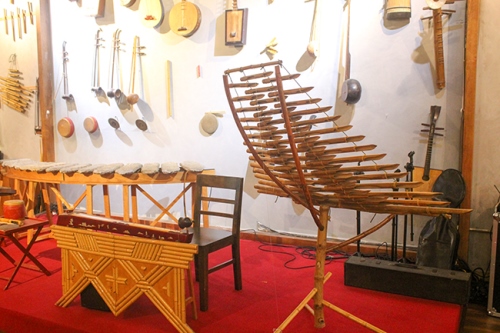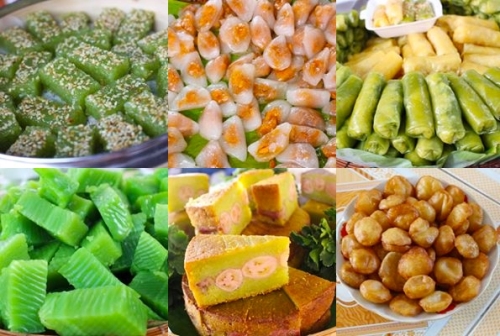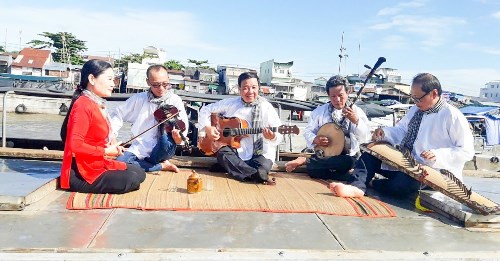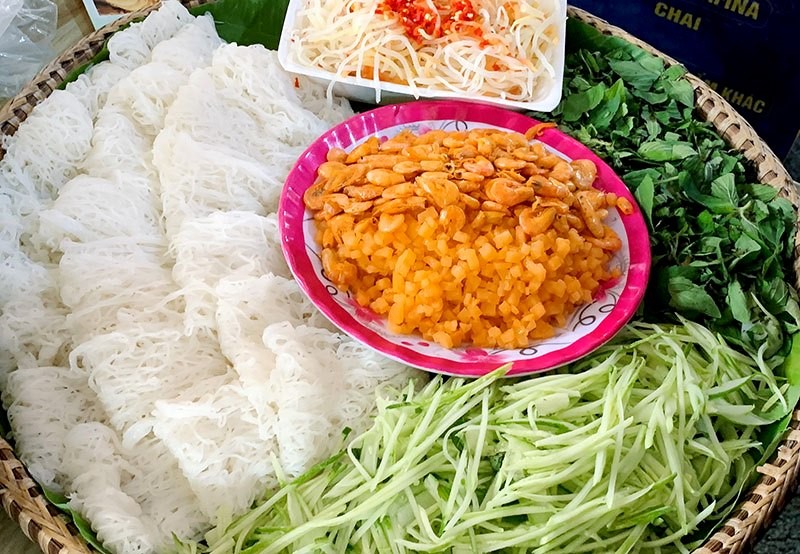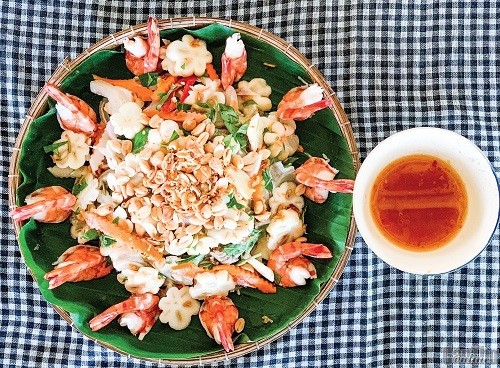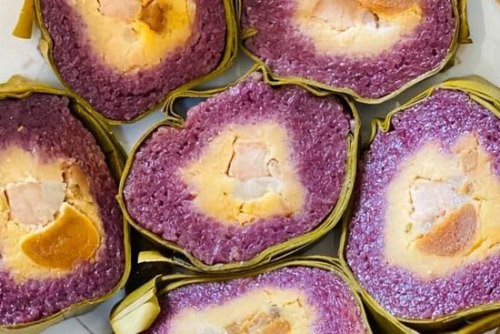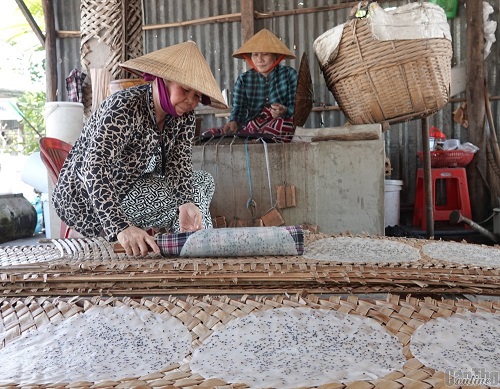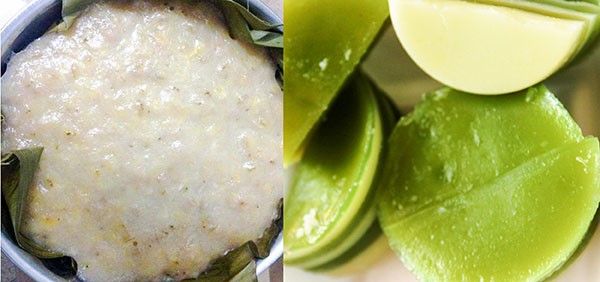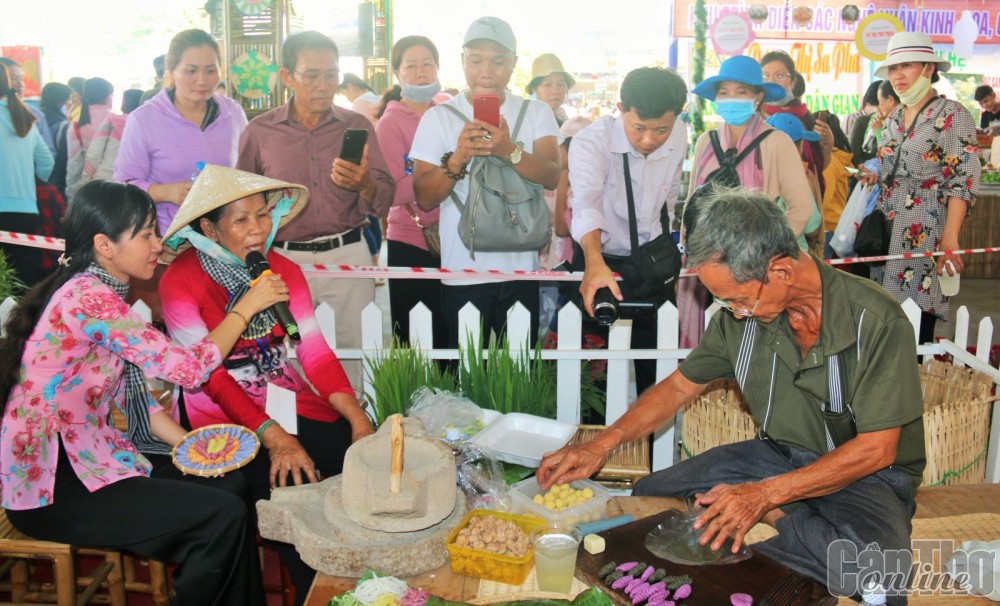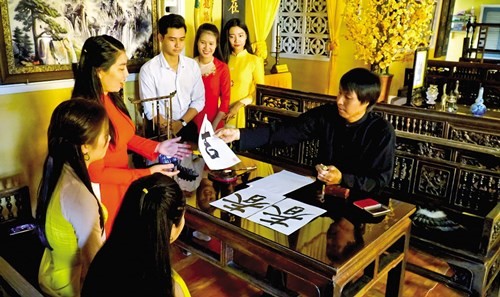
In the beginning, Tet parallel sentences were used as objects to eliminate evils. With the need to protect themselves for a good life, the ancients created two ways of defense and survival. The first is through wisdom and experience, the second is through exorcism and rituals depending on the circumstances. They recognized that their life and crops were directly determined by the change of nature which, in their belief, was the world of divine powers.
These divine powers were visualized and represented by legendary animals. Azure Dragon (Green Dragon) shields the sky, representing spring and the East; White Tiger (unicorn) represents autumn and the West; the phoenix (sometimes replaced by Vermillion Bird) represents summer, the South; Black Tortoise (a half-tortoise and half-snake mascot) represents winter, the North. It was believed that all natural disasters or illnesses were due to the harassment of evil spirits; people had to rely on the power of the guardian deities through exorcism or incantation and amulets, to eliminate misfortunes.
The statues or objects of exorcism are diverse and plentiful; which are mostly derived from myths. Each exorcism has different functions and uses. For example, trigrams should be hung up high above the main doors or beams. Images of Môn thần (the deity protecting the doors) are stuck on both sides of the main door ... And this practice has been considered as the origin of the parallel sentences.
Legend has it that in the middle of the sea is Do Soc Mountain, where there is a big Sapele tree with crooked branches spreading to three thousand miles. In the small branches of the Northeast, there are demons, and two deities guard this gate are Thần Thư and Uất Luật. Therefore, at the end of December, people often draw pictures of two deities and hung them on two pieces of reed on both sides of the main door to exorcise demons. Their pictures are also painted on a plank of Sapele wood, hanging on both sides of the main door in the hope that bad luck will not happen to their families throughout the year. Sapele tree is used because it was thought to be spirituality, containing the quintessence of the five elements. Later, instead of drawing pictures, people began to write letters on Sapele plank, so it was called đồ đào phù (charm spell written on Sapele). Despite its derivation from the ancient mystical ideology, these practices have been maintained and improved by the time. The spell is replaced by sentences taken from classic characters or literary works, or by traditional wishes for the endless joy and happiness. From the superstitious and vulgar form of the early days, hanging parallel sentences has become the custom of Asians (1).
Until now, the oldest Tet parallel sentences are considered to be written by Scholar Tân Dần Tốn, dating back thousands of years, and has been well preserved:
Tân niên nạp dư khánh
Gia tiết hiệu trường xuân
(The New Year brings full of good luck,
Good Lunar New Year signals the endless spring days) (2)
This sentence shows that at that time, Tet parallel sentences conveyed people’s welcoming good fortune and good luck.
The sentences are usually written on scarlet paper, in black ink, or golden one. Sometimes they are written on red golden-plated paper. Because it is spring day, the sentences usually express good wishes for peace and prosperity:
Bộc trúc nhất thanh trừ cựu tuế,
Đào phù vạn hộ cánh tân xuân
(Bamboo firecracker sounds like a farewell to the old year,
Sapele spells are hung on all doors to welcome the new spring)
Or:
Phước lộc thọ tam tinh cùng chiếu,
Thiên địa nhân nhất thể đồng xuân
(The three blessed stars of blessings are all shining,
Heaven, earth, people enjoy spring)
Or:
Phương thảo xuân hồi y cựu lục,
Mai hoa thời đáo tự nhiên hương
(Spring comes again, and green grass is fragrant as ever,
Apricot blooms, spreading natural fragrance)
For traders, it is desirable to sell at a profit:
Môn đa khách đáo thiên tài đáo,
Gia hữu nhân lai vạn vật lai
(The shop is crowded, so lots of money comes,
More people visit the shop, so many purchases are done)
Or:
Môn nghinh xuân hạ phúc
Hộ nạp đông tây tài.
(The door opens to welcome blessed spring and summer
The family get both eastern and western currency (3)
As Tet comes, the heavens and sky, people are one year older, which marks their maturity, and their happiness to welcome spring. That spring comes with hundreds of blooming flowers and cool fresh air is the most sacred moment of the year for everyone to rest and enjoy after a hard-working year. It is also the time for them to review what they have done in the previous year so as to have a good plan for the better coming year. Therefore, it is in spring that everyone is happy, emerging themselves into the spring atmosphere and enjoying happiness everywhere:
Thiên tăng tuế nguyệt, niên tăng thọ
Xuân mãn càn khôn, phúc mãn đường
(Time has more months and years, and people live longer
Spring is everywhere, blessing all families)
Phúc (Being blessed) is the upmost good that people wish for. According to Eastern philosophy, being blessed means having a lot of descendants, helping to increase labor for production. Therefore, among the Tam Tinh “Phúc, Lộc, Thọ” (3 blessings: being blessed, prosperous and living long), Phúc (being blessed) is first. Spring is the first in all seasons of a year as it helps the fruit tree to be lush, bringing many wishes of peace, so people commonly wish to be blessed:
Tứ thời xuân tại thủ
Ngũ phúc thọ vi tiên
(The first of the four seasons is spring
The first among five blessings is longevity)

A happy young lady with the hand lettering of "Parents". Photo: Duy Khoi
Tet is also an opportunity for people to commemorate the ancestors’ gratitude and nurture, so the ancestor altar of Tet Holiday usually has tea, burning incense and parallel sentences expressing their gratitude to ancestors and the elderly. The glass sentences honor the merit of the superiors and the ancestors.
Cúc dục ân thâm Đông hải đại
Sinh thành nghĩa trọng Thái Sơn cao
(What our parents have nurtured us is as deep and large as the East Sea
That they gave birth to us is higher than Thai Mountain)
Today, in addition to writing sentences in Chinese, people also write sentences in Vietnamese, expressing their desire for a strong, prosperous and happy country. Vietnamese sentences are sometimes written in Chinese lettering, so it is very beautiful and formal:
Đậm đà nghĩa nước tình nhà, cơ nghiệp trời Nam bền vạn thuở
Khắn khít lòng Dân ý Đảng, cõi đất Việt sáng nghìn thu
(Love for family and country is deep, and the nation stays strong and long
Vietnamese people’s will and ideas are closely connected to the Party’s, and Vietnamese land is shining in thousands of years)
(Huynh Thi Phuong Giang)
In addition to the parallel sentences, people also use red paper cut into square sheets either 20cm x 20cm or 30cm x 30cm, writing a single letter with auspicious meaning such as Phuoc (being blessed), Loc (prosperity), Tho (longevity), Khang (good health), Ninh (peace)... They can skillfully write four letters into a square such as Hoàng kim vạn lượng (thousands of gold bars and coins), Chiêu tài tiến bửu (Attracting more talented people to get more profits) ... These papers are stuck on walls, doors, cabinets, chests of drawers ... The square paper is stuck in a special way, with four right angles perpendicular to the vertical, left and right. Among the aforementioned letters, people write the word Phúc the most. This word now means happiness while its old meaning was the blessing due to good fortune. Also due to the pursuit of good fortune, people have the habit of sticking the word Phuc in reverse called Phúc đảo (happiness to come), meaning auspicious, wishing for a blessed year of good fortune. (4)
People often bought sentences written by scholars in Tet market sessions in the past. The scholars often sat on a mat on the street and wrote letters as required. Tet would be incomplete if there were no parallel sentences at home during Tet holidays because this practice features Vietnamese elegant tradition, rich culture, humanity as well as a peaceful and happy life.
Here the famous sentences that all of us know are:
Thịt mỡ dưa hành, câu đối đỏ
Cây nêu tràng pháo, bánh chưng xanh
(Fat meat, pickled onions, red parallel sentences.
New Year pole, strings of firecrackers, green bánh Chưng)
These timeless sentences are popularly written and heard today. When we read them, we can feel the spirits of our ancient people as expressing the spring atmosphere.
.................
(1) Nguyen Huy Hoang (2004), Parallel sentences in Vietnamese culture, Ho Chi Minh City Publishing House, pp.7-12.
(2) Ly Luoc Tam (2002), Spring parallel sentences, Xua and Nay Journal, No. 108 + 109, p.8.
(3) Huynh Ngoc Trang (2018), Lunar New Year Discussion, Ho Chi Minh City Culture and Arts Publishing House, pp.106-107.
(4) Ly Luoc Tam, cf, p.9.
Source: Can Tho Newspaper - Translated by Diep Truong





